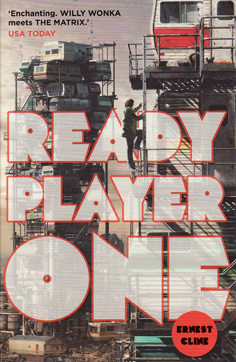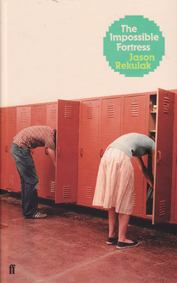I finished reading Ready Player One yesterday afternoon and last night I went to see Blade Runner 2049. I rarely watch new movies in the cinema now, but the new Blade Runner was a must see. The original was one of my favourite films of the 1980s, even before the Director’s Cut removed the voiceover and the terrible ending. And that’s a small example of what makes me the part of the demographic for the audience of this novel. Ready Player One is something of a homage to the 1980s, particularly all things geeky in that decade. If you grew up in the 1980s, as I did, loved Blade Runner, played computer text adventure games, got together with your friends on a weekend and played Dungeons and Dragons, or loved eighties music, but then seemed to leave that all behind as the nineties were ushered in, and eventually Y2K turned into a big nothing and the new century turned the geeky obsession with 1980s computing into mainstream life via powerful computers connected to the Internet, then this book is probably for you. This is a book steeped in nostalgia. It reminded me a little of The Impossible Fortress by Jason Rekulak, which I reviewed earlier this year. The 1980s seem to have become a thing.
I started the book late one night before bed, intending to only read the first page or two to get a feel for it, and found myself at the end of the prologue before I realised it. So, the first thing to say is that it’s an easy read and engrossing. The prologue (given the title “0000”) introduces us to a world in which Wade Watts, like millions of others, have spent the last five years looking for an easter egg
in a giant computer simulation environment known as OASIS. OASIS is an environment where people can live their lives online hooked in by haptic suits that allow an advanced experience of virtual reality. People create businesses online, homes, form relationships and travel in this virtual universe. The OASIS universe allows travel to other planets, many of which are fictional planets dedicated to aspects of 1980s pop-culture. James Halliday, the creator of OASIS, has died with no heirs. Instead, he leaves a conundrum. The first person to find an easter egg he has hidden in the OASIS system will inherit all his wealth and the control of the OASIS system. Naturally, the response is huge, making everything about James Halliday – his life and obsessions – the study of millions of gunters
(easter egg hunters) around the world. When I finished the prologue my first thought was of Charlie and the Chocolate Factory, a favourite book from my childhood. The similarity is obvious. Then, when I closed the book I saw the reviewer blurb on the front cover which I had previously missed: WILLY WONKA meets THE MATRIX
. I smiled. And yes, there are obvious comparisons to make to The Matrix, too.
I think the best way to describe the plot of Ready Player One is that it is like an immersive first-person video game on a massive scale. The novel is set in 2045, so close to the new Blade Runner period. And like the world of Blade Runner, the world of Ready Player One is a dystopian mess. The environment is ruined, society lacks sufficient fuel and overpopulation is rife. Wade lives in the stacks
, the slums created on the edge of the city where trailers have been stacked high, one on top of the other like sky scrapers, to maximise the land available. In these parks crime is rife, poverty is real and there is the ever-present threat of death if a trailer stack topples over. The chain reaction is like dominoes falling. The OASIS offers escape and the search for Halliday’s egg offers hope. Wade, who attends a virtual school, is intelligent but disengaged. His real study is everything about the eighties and Halliday’s life, because he knows that without that knowledge he has no hope of ever reaching his goal. He spends the bulk of his time online as Parzival, like Arthur’s Percival, searching for his own version of the Holy Grail.
Of course, Wade has competition. Apart from the millions of other gunters, gunter clans have been formed to pool effort, knowledge and resources. But the real enemy is Innovative Online Industries (IOI) who command vast financial and tactical resources in the OASIS world, as well as an army of gunters known as the sixers
(for the 6 digit employee numbers their avatars are known by) who have signed their rights away to the company. Against this, Wade has only his wits. Even OASIS friends like Aech and Art3mis, are in competition with Wade, since each is determined to remain independent and win the competition alone.
As enjoyable as I found this book, I did find that Cline’s referencing of eighties culture was narrow. It is necessarily limited to the geek culture the book is meant to appeal to. But it is also the kind of nostalgic indulgence that elides much of what the eighties were, suggesting that old maxim of things were better back then
, when they probably weren’t. As much as I loved some of what Cline remembers, I also remember hating the period in which I grew up. The eighties had become too conservative, I remember thinking as a teenager. I grew up in the era of AIDS (never mentioned in the book). The counterculture of the sixties and seventies seemed over. A lot of the music was bad – we only remember the good eighties music. Before the collapse of the Soviet Union there seemed to be an ever-present threat of nuclear annihilation (sure, it’s coming back). And with the rise of corporate power, so aptly captured in Gordon Gekko’s phrase from the Wall Street movie, Greed is Good
, there seemed a jarring disconnect from traditional social values as a globally connected world ushered in ever-changing ethics. I found this last particularly absent from Cline’s eighties version. Instead, the representation of corporate greed is shifted into our future in the year 2045, with the IOI, which is really, let’s face it, a representation of unscrupulous corporate behaviour in our present times, where the geek world and its nascent promise of freedom and equality has been appropriated for its power to serve The Man.
Despite this, I really enjoyed the book. To find Halliday’s egg the gunters have to find three keys and clear three gates using their knowledge of the eighties culture. I have to admit, when the Dungeons and Dragons classic module, Tomb of Horrors, suddenly became a part of the plot near the beginning, I was hooked. When I was in Year 9 a group of my friends would go to one of the history classrooms each lunchtime where our history teacher, Phil McGregor, would host a game as the Dungeon Master. McGregor was co-author of Space Opera and Aftermath, science fiction role playing games popular at the time, along with many other modules for these and other games. So, he was something of a legend to us and a big influence. We played Tomb of Horrors, along with other games, during our lunch times that year. I think we mostly got killed. Someone might have been turned into a girl. It was all fun.
And that’s what this book celebrates. The plot, as I have said, is like the plot of a video game and it connects to all those good memories if you grew up at the right time. I think it would still be entertaining for younger readers, although they might have to look up some of the references to games, movies and music. I did myself. I had never heard of Rush’s album, 2112, but I now own a copy on my iPad. The technology may have changed, but like the world of OASIS, it only serves to preserve the past: at least a version of the past.
A highly recommended book for some fun and a light read.

 RSS Feed
RSS Feed Facebook
Facebook Instagram
Instagram YouTube
YouTube Subscribe to our Newsletter
Subscribe to our Newsletter




No one has commented yet. Be the first!